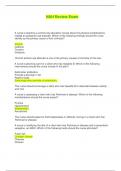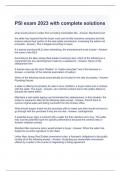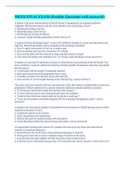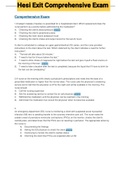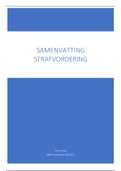Consciousness – Key Terms
and Theories
IBP Leiden
,AI (weak vs. strong) • Strong AC: we can create consciousness by building machines
➔ Strong AI: a computer with the right programme would be intelligent and have a mind
just as we do -> Chinese room experiment
• Weak AC: we can learn about consciousness through machines, but cannot create
consciousness artificially
➔ Weak AI: computers can never gain real intelligence and consciousness, only as-if states
• Chalmers: a model that I computationally equivalent to a mind will itself be a mind
• Narrow and general AI: Many AI techniques outperform humans on specific tasks,
but nothing else! Very domain-specific -> NO AI General Intelligence
Altered states of • ‘a qualitative alteration in the overall pattern of mental functioning, such that the
consciousness experiencer feels his consciousness is radically different from the way it functions ordinarily’
(Tart)
• Temporary nature of alterations in the representational mechanisms of consciousness
• Normal distribution of some ASC like psychosis continuum
• Question of definition: physiological, neurological, cognitive/subjective, objectively?
• Laureys: two axes: arousal and complexity of representation (normal: bth high; sleep:
both low)
• Tart: rationality & ability to hallucinate
, • Hobson: ration between amines and cholines: waking – amine neurotransmtters are
prevalent including NA, SE ; REM – acetylcolines take over and thinking becomes more
delusional, irrationa, unreflective -> information source (internal vs external), activation
energy, (high vs low) mode (amino vs coline)
•
Anesthesia • blocking at the level of thalamus (and cortico-cortical reverberant loops)
• breakdown of cortico-thalamic connectivity prevents the integration of information
• functioning at the NMDA synapses may be necessary for consciousness (Ketamine studies ->
NMDA antagonist, blocking glutamate)
• paralysis, pain numbing, amnesia, loss of consciousness
• Being under anaesthetics is not the same as being unconscious
Approaches to AI • Two disciplines in AI:
- CS/engineering = how can we build machines that produce intelligent behaviour?
- Cognitive science = the study of the underlying computations of intelligent BH
• Reverse modelling: looking at implementations of cognition (human brain), can we infer
mechanisms behind it?
• Forward modelling: designing a system, investigating its behaviour
, Arguments for/against NO!: Biological argument
AI
• Searle: collection of cells can lead to a thought/action/consciousness -> needs physical-
chemical properties -> only brains cause minds!
• Rule based manipulation of symbols does not constitute intelligence: the inhabitant of the
Chinese room does not understand Chinese
• Searle: the Turing test or any other purely behavioral test is insufficient to distinguish
genuine cognition from behavior which successfully imitates or simulates cognition
• consciousness can be simulated NOT created
• Searle: if no single part of the room can understand Chinese therefore as a whole the system
can't understand Chinese either
• critique by Dennett: no single neuron can understand Chinese therefore using Searle’s logic
the whole brain cannot understand Chinese
• Brain Simulation Reply: replacing neurons with Chinese rooms -> at what point is it not
intelligence/ language understanding anymore
NO!: Lovelace -> Creativity
• computers will never be able to do anything new -> CREATIVITY
• but there are creative algorithm
• objections: computers cannot do anything new they are programmed
• humans can do new things they are not programmed but evolved over hundreds of
thousands of generations; what have we evolved computers could they then do something
new?
• Objection: Evolutionary robotics: pick a population of random robots that maximizes a fitness
function, replenish population with mutations, repeat Speech; Sims: evolving walking robots can
cause cheating behaviour -> unexpected BH -> creativity?
YES!: Computationalist Argument
• the mind itself is a computational system that is implemented in the brain
• Computation is the rule-based manipulation of information
• computational system ≠ computer
• Substrate independent: if cognition is merely the calculations going on in the brain we should
be able to perform the same calculations in silico
• Blue Brain project: simulating neural systems with supercomputer
• Connectionism:
- Biologically inspired: based on structure of human brain
- Lesion tolerant: lesioned or damaged networks can still process info
- Capable of generalization: ANN are capable of learning, and able to generalize rules to
novel input
- Computation: neurons output a signal based on their input signal -> multilayer perceptions
implement rules like AND, OR, XOR
- =synapse -> computation Is massively parallel: output a signal based on input signal
and Theories
IBP Leiden
,AI (weak vs. strong) • Strong AC: we can create consciousness by building machines
➔ Strong AI: a computer with the right programme would be intelligent and have a mind
just as we do -> Chinese room experiment
• Weak AC: we can learn about consciousness through machines, but cannot create
consciousness artificially
➔ Weak AI: computers can never gain real intelligence and consciousness, only as-if states
• Chalmers: a model that I computationally equivalent to a mind will itself be a mind
• Narrow and general AI: Many AI techniques outperform humans on specific tasks,
but nothing else! Very domain-specific -> NO AI General Intelligence
Altered states of • ‘a qualitative alteration in the overall pattern of mental functioning, such that the
consciousness experiencer feels his consciousness is radically different from the way it functions ordinarily’
(Tart)
• Temporary nature of alterations in the representational mechanisms of consciousness
• Normal distribution of some ASC like psychosis continuum
• Question of definition: physiological, neurological, cognitive/subjective, objectively?
• Laureys: two axes: arousal and complexity of representation (normal: bth high; sleep:
both low)
• Tart: rationality & ability to hallucinate
, • Hobson: ration between amines and cholines: waking – amine neurotransmtters are
prevalent including NA, SE ; REM – acetylcolines take over and thinking becomes more
delusional, irrationa, unreflective -> information source (internal vs external), activation
energy, (high vs low) mode (amino vs coline)
•
Anesthesia • blocking at the level of thalamus (and cortico-cortical reverberant loops)
• breakdown of cortico-thalamic connectivity prevents the integration of information
• functioning at the NMDA synapses may be necessary for consciousness (Ketamine studies ->
NMDA antagonist, blocking glutamate)
• paralysis, pain numbing, amnesia, loss of consciousness
• Being under anaesthetics is not the same as being unconscious
Approaches to AI • Two disciplines in AI:
- CS/engineering = how can we build machines that produce intelligent behaviour?
- Cognitive science = the study of the underlying computations of intelligent BH
• Reverse modelling: looking at implementations of cognition (human brain), can we infer
mechanisms behind it?
• Forward modelling: designing a system, investigating its behaviour
, Arguments for/against NO!: Biological argument
AI
• Searle: collection of cells can lead to a thought/action/consciousness -> needs physical-
chemical properties -> only brains cause minds!
• Rule based manipulation of symbols does not constitute intelligence: the inhabitant of the
Chinese room does not understand Chinese
• Searle: the Turing test or any other purely behavioral test is insufficient to distinguish
genuine cognition from behavior which successfully imitates or simulates cognition
• consciousness can be simulated NOT created
• Searle: if no single part of the room can understand Chinese therefore as a whole the system
can't understand Chinese either
• critique by Dennett: no single neuron can understand Chinese therefore using Searle’s logic
the whole brain cannot understand Chinese
• Brain Simulation Reply: replacing neurons with Chinese rooms -> at what point is it not
intelligence/ language understanding anymore
NO!: Lovelace -> Creativity
• computers will never be able to do anything new -> CREATIVITY
• but there are creative algorithm
• objections: computers cannot do anything new they are programmed
• humans can do new things they are not programmed but evolved over hundreds of
thousands of generations; what have we evolved computers could they then do something
new?
• Objection: Evolutionary robotics: pick a population of random robots that maximizes a fitness
function, replenish population with mutations, repeat Speech; Sims: evolving walking robots can
cause cheating behaviour -> unexpected BH -> creativity?
YES!: Computationalist Argument
• the mind itself is a computational system that is implemented in the brain
• Computation is the rule-based manipulation of information
• computational system ≠ computer
• Substrate independent: if cognition is merely the calculations going on in the brain we should
be able to perform the same calculations in silico
• Blue Brain project: simulating neural systems with supercomputer
• Connectionism:
- Biologically inspired: based on structure of human brain
- Lesion tolerant: lesioned or damaged networks can still process info
- Capable of generalization: ANN are capable of learning, and able to generalize rules to
novel input
- Computation: neurons output a signal based on their input signal -> multilayer perceptions
implement rules like AND, OR, XOR
- =synapse -> computation Is massively parallel: output a signal based on input signal

